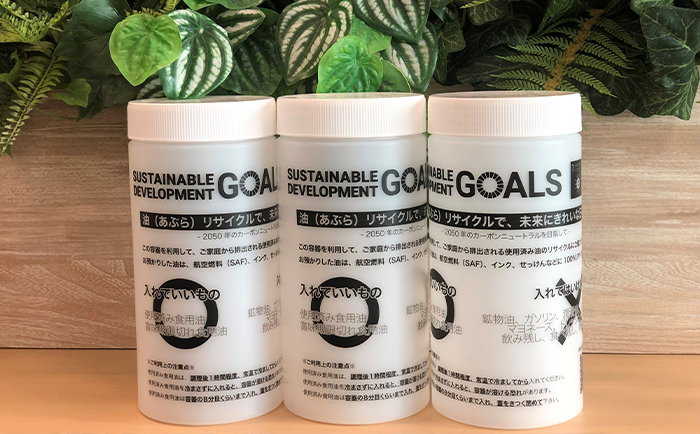2024.08.22

Used Cooking Oil Turned into Aviation Fuel
ENEOS Working with Business Partners and the Governments to establish a More Sustainable World

Returnable bottles for the collection of used cooking oil from household
ENEOS Corporation (“ENEOS”), the energy business unit of the ENEOS Group, is working with several companies and the governments to refine sustainable aviation fuel (SAF) from used cooking oil. This initiative is a quite new to reduce greenhouse gas emissions.
Since 2023, ENEOS has been implementing the project to produce from used cooking oil to
sustainable aviation fuel (SAF).
Under the project, used cooking oil collected from restaurants and other facilities will be
refined as raw materials at SAF production plant that ENEOS is building in Wakayama
Prefecture.
ENEOS regards both the social issues (included resolution of climate change) and the
promotion of sustainable development as the management priorities and implements measures to
reduce greenhouse gas (GHG) emissions, such as introducing green electricity produced from
renewable energy and afforestation in Japan and overseas. ENEOS has set the target of
reducing our GHG emissions by 46% by fiscal 2030* and achieving net zero emissions by fiscal
2040.
* Compared with the fiscal 2013 level
“When we started, we hadn’t almost had the connections with non-households emitted used
cooking oil, such as restaurants. In addition, we didn’t have know-how to handle with used
cooking oil,” says Yoshiki Hiromoto from Biofuel Group 2 at ENEOS’s Biofuel Business
Department. “Therefore, we made the decision to be partnered with Yoshikawa Yushi, a company
specializing in the collection of used cooking oil, and Nomura Jimusho, a trading company,
to build relationships with restaurants and other relevant non-households and create a
reliable supply chain.”
The supplying limitation of used cooking oil
The way to refine SAF from used cooking oil that ENEOS intends to deploy is already very
common for commercial production plant around the world. However, there seem to be
quantitative constraints on the method, which ENEOS recognizes.
“It is true that we face with the challenges of quantities,” Hiromoto explains. “Used
cooking oil available in Japan amounts to around 500,000 tons per year. If we launched the
full operation the SAF production plant in Wakayama, we would need to collect whole Japanese
used cooking oil. This isn’t realistic, of course, and, if we consider about the population
reduction of Japan in the near future, it is difficult to expect the amount of used cooking
oil available is going to increase.”
There are different ways to deal with used cooking oil generally, depending on whether it is
collected at non-households (like a restraint and hotels) or households. While we usually
dispose cooking oil, that produced by non-households is collected almost in its entirety and
is recycled, primarily for use as feed for pigs and cows. Any plan to use large amounts of
used cooking oil to produce SAF could therefore affect the conventional supply and demand
balance, as well as the price. For this reason, ENEOS has focused on the second largest use:
exports. Used cooking oil exported from Japan is actually already being used to produce SAF
and biodiesel fuels in destination countries.
“This is why we want to ensure that the used cooking oil produced in Japan is used
domestically as much as possible,” says Hiromoto. “Our idea is to divert those amounts that
are intended for export. Going forward, we also intend to bring the project to full scale by
addressing used household cooking oil as well. We plan to establish collection sites
together with local governments and other entities.”
Last year, the Tokyo Metropolitan Government’s Bureau of Environment called for proposals
for a subsidy program on the collection of used household cooking oil, and ENEOS and Seven &
i Holdings jointly submitted a proposal, which was successfully adopted. Used household
cooking oil is now being collected at 13 Ito-Yokado stores in Tokyo as of May 2024, with
plans under discussion to add convenience stores to the collection network.
Increasing the proportion of SAF to 10% of all aviation fuels by 2030
The recycling of cooking oil for this purpose began when the reduction of GHG emissions
became a major issue for society. But used cooking oil has long been the main raw material
used to produce SAF around the world.
So why have Japanese oil companies been unwilling to recycle cooking oil? Two of the major
reasons are that SAF is expensive to produce and that the market is not large enough to
support mass production and mass transportation.
In such a situation, what made ENEOS decide to produce SAF from used cooking oil?
“The reason is that there is a global move toward carbon neutrality in the aviation sector,”
explains Hiromoto. “Even in Japan, a public-private council for the wider use of SAF that
consists of representatives of the oil industry and relevant government offices has set
forth a policy to replace 10% of the aviation fuels supplied by oil companies with SAF by
2030. This suggests that the use of SAF will likely become mandatory in the future. With
this in mind, we have to be ready to supply SAF made from cooking oil by 2030. This is
partly for compliance with regulations, but also to keep up with global trends amid
shrinking domestic demand due to the declining population. We also want to establish an
additional business segment that will be able to offset potential future revenue declines.
This is the thinking behind our policy.”
ENEOS is building an integrated system for SAF, from raw materials procurement to in-house
manufacturing, and sales The ongoing initiative is the first stage of this new challenge. As
to plans to increase the amount of used cooking oil available, Hiromoto emphasizes that
ENEOS intends to formulate various collection scenarios for used household cooking oil and
will perform field trials aimed to social implementation.
“Additionally, we have been introduced to retail stores, restaurants, and other places
connected with Suntory. This benefits both companies because naphtha, a raw material used to
make plastic bottles, is produced as a by-product of the SAF production process. We are
taking on the challenge of reducing GHG emissions through such joint initiatives with other
companies.”
INTERVIEWEES

YOSHIKI HIROMOTO
Chief Staff Member, Biofuel Group 2, Biofuel Business Department
ENEOS Holdings, Inc.
1-1-2 Otemachi, Chiyoda-ku, Tokyo
Established in 2010, ENEOS Holdings is engaged in energy, oil and natural gas E&P as well as metals, high performance materials, electricity and gas retailing, and renewable energy businesses, based on the ENEOS Group Long-Term Vision of taking on the challenge of achieving both a stable supply of energy and materials and the realization of a carbon neutral society.
